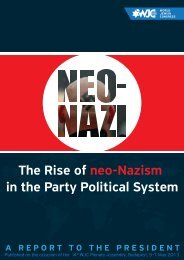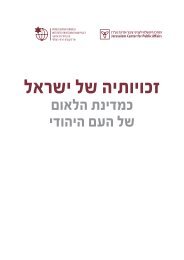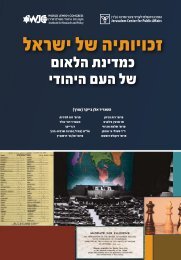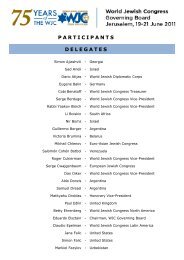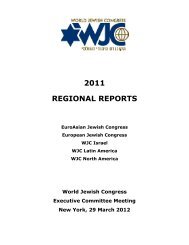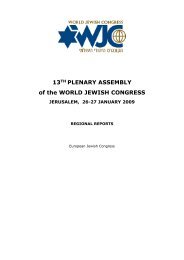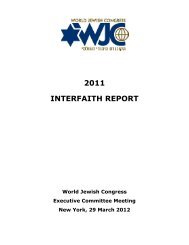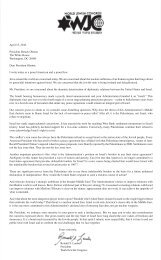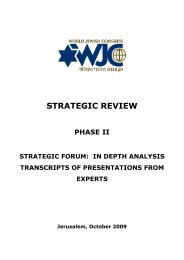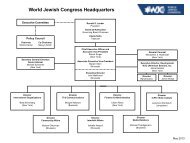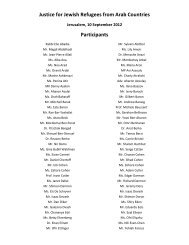Antisemitism Report 2009 - World Jewish Congress
Antisemitism Report 2009 - World Jewish Congress
Antisemitism Report 2009 - World Jewish Congress
You also want an ePaper? Increase the reach of your titles
YUMPU automatically turns print PDFs into web optimized ePapers that Google loves.
"In our opinion the sentence of three months ... cannot on any stretch of imagination be said to be excessive or<br />
unwarranted."<br />
Jeremy Jones, former president of the Executive Council of Australian Jewry, brought the case against Toben<br />
on the grounds he had persistently breached the Racial Discrimination Act following a 2002 court decision<br />
against him.<br />
Toben committed contempt of court on 24 occasions, wilfully disobeying court orders by keeping anti-Semitic<br />
material on his Adelaide Institute website.<br />
He was held in Britain for nearly two months last year while German prosecutors tried unsuccessfully to<br />
extradite him on charges of publishing internet material "of an anti-Semitic and/or revisionist nature".<br />
Toben also spent seven months in Mannheim prison in 1999 for inciting racism.<br />
After Justice Spender read the court's decision, Toben stood and asked if he could say something, to which the<br />
judge said no.<br />
Toben then loudly said "following blind orders", as the judges left the court.<br />
The author of this report wrote the following , published in the Australian <strong>Jewish</strong> News:<br />
The End of the Beginning<br />
Jeremy Jones<br />
After a long, complex, considered debate, the Commonwealth Parliament amended the Racial<br />
Discrimination Act in 1995 to cover racially offensive or abusive behaviour. The primary motivation<br />
for the new law was the lack of recourse available to Australians who were having their quality of life<br />
diminished by the actions of racist groups and individuals.<br />
The legislation has now been in place for more than 13 years and, with the prison sentence being<br />
served by Fredrick Toben, we can see that there can be real consequences for a person who refuses to<br />
respect this law.<br />
Fredrick Toben had been disseminating offensive material denying the reality of the Shoah and<br />
haranguing victims of Nazism prior to the introduction of the Racial Hatred Act. Once the law came<br />
in to force, the publication of material in his newsletters and promotion of these and other materials<br />
on his internet site prompted a huge volume of communication to me by members of the public whom<br />
he upset, offended and intimidated – and who wanted the Executive Council of Australian Jewry<br />
(ECAJ) to consider action against him.<br />
The Adelaide Institute‘s anti-<strong>Jewish</strong> content was not the only matter of concern at the time, and the<br />
ECAJ gave careful consideration as to what, if any, complaints should be pursued under the new law.<br />
In a relatively short period of time, three complaints were taken to the Human Rights and Equal<br />
Opportunity Commission (HREOC). In reflecting on the imprisonment of Fredrick Toben, it is<br />
valuable to recall what happened in these cases.<br />
El Telegraph, an Arabic-language newspaper published in Sydney, participated in a conciliation<br />
process and eventually published an apology for an antisemitic article and also ran an article<br />
promoting <strong>Jewish</strong>-Arab joint efforts to fight racism in Australia.<br />
104



